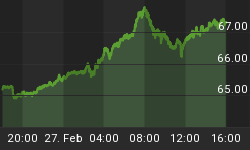The following is excerpted from a commentary originally posted at www.speculative-investor.com on 19th August 2012.
The answer to the above question is no, meaning that "Austrian Economics" makes no prediction about whether the future will be inflationary or deflationary. That's why some adherents to "Austrian" economic theory predict inflation while others predict deflation. An economic theory can give you an idea of what will happen if certain policies are implemented; it doesn't tell you what will happen regardless of policy choices. To explain what we mean we will zoom in on two famous quotes of Ludwig von Mises, the most important economist of the "Austrian" school.
Here's the first quote:
"There is no means of avoiding the final collapse of a boom brought about by credit expansion. The alternative is only whether the crisis should come sooner as the result of voluntary abandonment of further credit expansion, or later as a final and total catastrophe of the currency system involved."
The first sentence of this quote is sometimes taken out of context as part of an argument in favour of deflation. It could be construed, if considered in isolation, as a statement that a period of deflation must follow a credit-fueled boom. However, no good economist, let alone the greatest economist of the past century, would ever claim that price deflation was inevitable regardless of what was happening to the money supply. To do so would be to claim that the law of supply and demand did not apply to money. In the real world there will always be a link between money supply and money purchasing power. The link is complex, but it will always be possible to reduce the purchasing power of money by increasing its supply.
The second sentence provides the necessary clarification. In essence, it says that a boom fueled by a great credit expansion can collapse in one of two ways. The first is by voluntarily ending the credit expansion. This would generally involve doing nothing or very little while a corrective process ran its course. The other is by relentlessly persisting with credit expansion in a non-stop effort to avoid a crisis. This would lead to a total catastrophe of the currency system, meaning that it would lead to the currency becoming completely worthless.
The first of the two alternatives is the deflation path. The second is the inflation path (relentless monetary inflation leading to hyperinflation and, eventually, to the currency becoming so devalued it no longer functions as money). Note that money can only collapse due to inflation. Deflation makes money more valuable.
The Fed is presently heading down the inflation path, but it doesn't have to stay on that path. A change of direction is possible.
We now move on to the other Mises quote mentioned in the opening paragraph:
"This first stage of the inflationary process may last for many years. While it lasts, the prices of many goods and services are not yet adjusted to the altered money relation. There are still people in the country who have not yet become aware of the fact that they are confronted with a price revolution which will finally result in a considerable rise of all prices, although the extent of this rise will not be the same in the various commodities and services. These people still believe that prices one day will drop. Waiting for this day, they restrict their purchases and concomitantly increase their cash holdings. As long as such ideas are still held by public opinion, it is not yet too late for the government to abandon its inflationary policy.
But then, finally, the masses wake up. They become suddenly aware of the fact that inflation is a deliberate policy and will go on endlessly. A breakdown occurs. The crack-up boom appears. Everybody is anxious to swap his money against 'real' goods, no matter whether he needs them or not, no matter how much money he has to pay for them. Within a very short time, within a few weeks or even days, the things which were used as money are no longer used as media of exchange. They become scrap paper. Nobody wants to give away anything against them."
The gist is that if the inflation policy continues for long enough then a psychological tipping point will eventually be reached. At this tipping point the value of money will collapse as people rush to exchange whatever money they have for 'real' goods. Mises refers to this monetary collapse as the "crack-up boom". Prior to this point being reached it will not be too late to abandon the inflation policy.
Today, the US is clearly still in the first stage of the inflationary process. If it continues along its current path then a "crack-up boom" will eventually occur, but there is no way of knowing -- and "Austrian" economic theory makes no attempt to predict -- exactly when such an event will occur. If the current policy course is maintained then the breakdown could occur within 5 years, but it could also be decades away. In addition, there is still hope that policy-makers will wake up and change course before the masses wake up and trash the currency.
The upshot is that "Austrian" economic theory helps us understand the damage that is caused by monetary inflation and what the relentless implementation of inflation policy will eventually lead to. That is, it helps us understand the effects of various policy choices. It doesn't, however, make specific predictions about whether the next few years will be characterised by inflation or deflation, because whether there is more inflation (there has been inflation and nothing but inflation for generations) or deflation will depend on the future actions of governments and central banks. Regardless of how they are defined, at this stage neither inflation nor deflation is inevitable.
We aren't offering a free trial subscription at this time, but free samples of our work (excerpts from our regular commentaries) can be viewed at: http://www.speculative-investor.com/new/freesamples.html















